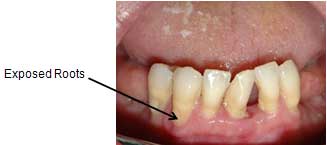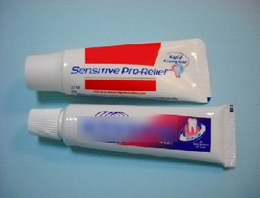Introduction
Tooth sensitivity is tooth discomfort or pain. Sensitive teeth occurs when the outer protective layers of teeth which are enamel or cementum are removed, exposing the dentin. Dentin is made up of tiny openings called tubules in which lies nerve branches that come from the tooth’s pulp (the nerve center of the tooth). When exposed dentine comes in contact with something cold, for example, the nerve endings in the tooth are stimulated. This gives rise to the pain of sensitive teeth.
Pain can be induced by the exposed dentine or receeding gums in response to stimuli such as :
- Taking hot, cold, sweet or sour food and drinks.
- Tooth brushing.
- Breathing in cold air through the mouth.
The pain experienced is usually short and sharp.

Exposed tooth roots are one of the manifestation of periodontal disease that can cause tooth sensitivity
Some causes of sensitive teeth include::
- Brushing teeth too hard. If you brush your teeth too aggressively, you may injure your gums and expose tooth roots. Horizontal brushing technique can lead to sensitive teeth.
- Periodontal disease, an infection of the gums and bone that support the teeth may also be responsible. If left untreated, periodontal disease can progress until the bone and other supporting tissues are destroyed, leaving the root surfaces of teeth exposed.
- Dentin exposure caused by actively proggressing tooth wear.
- Grinding or clenching teeth may wear down the enamel and expose the underlying dentin.
- Frequently eating acidic dietary sources like fruits, fruit juices or acidic beverages that cause tooth erosion.
- Untreated cavities.
- An old filling with a crack or leak.
- Gum surgery that exposes a tooth’s roots.
- Tooth whitening in some cases.
Treatment for sensitive teeth
- Use tooth paste for sensitive teeth. These toothpastes contain compounds that help block sensation travelling from the tooth surface to the nerve. Usually requires several applications before the sensitivity is reduced. Spread a thin layer of the toothpaste on the exposed tooth roots with your finger. These toothpastes contain either potassium salts, calcium phosphates, strontium salts or flouride that are effective in helping to prevent and protect against the pain of sensitive teeth.

Examples of tooth paste for sensitive teeth available in the market.
- See your dentist. The treatment depends on the cause of the sensitivity. A special desensitizing agent or flouride gel may be applied on the areas of the affected teeth. Some dentists may also apply bonding agents and varnishes. Fillings may be placed over the exposed roots with senstivity. If the tooth is decayed or broken, fillings or crown need to be constructed. To reduce pain due to grinding or clenching, the dentist will make a plastic night guard that should be used during sleep. Cracked tooth may need root canal treatment and later restored with a crown.
How to prevent tooth sensitivity
-
- Maintain good oral hygiene.
- Thoroughly clean all parts of your teeth and mouth with proper brushing and flossing techniques.
- Avoid horizontal brushing techniques. This can lead to recession and sensitivity.
- Maintain good oral hygiene.
-
- Use a soft bristled toothbrush.
Brush gently and carefully around the gum line to prevent tooth brush abrasion to the tooth surface and irritation to your gums.
-
- Use flouridated toothpaste.
Daily use of flouridated toothpaste and mouth rinse can protect your teeth as fluoride helps to harden the enamel.
-
- Watch what you eat.
Reduce or avoid consumption of highly acidic food and drinks like lemons, limes and carbonated beverages which can gradually dissolve tooth enamel and lead to dentin exposure. They may also aggravate the sensitivity and start the pain reaction. Rinse your mouth with water after consuming acidic food and drink. Avoid toothbrushing for at least 30 minutes after consuming acidic food and drink to reduce deleterious coeffects of acid and abrasion.
-
- Treat teeth grinding.
If you grind or clench your teeth, use a night guard at night.
-
- See your dentist at regular intervals.
Get professional dental check-up, tooth cleaning, oral hygiene instruction, and fluoride treatment every six months.
| Last Reviewed | : | 23 August 2019 |
| Writer / Translator | : | Dr. Fauziah bt. Ahmad |
| Accreditor / Reviewer | : | Dr. Roshima bt. Mohd Sharif |







